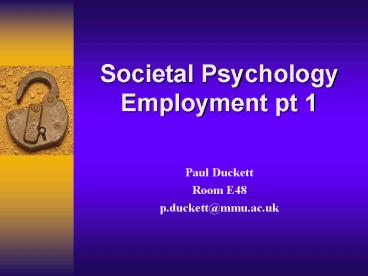Societal Psychology Employment pt 1 - PowerPoint PPT Presentation
1 / 18
Title:
Societal Psychology Employment pt 1
Description:
Context and self determination. DOCUMENTING ... and socio-political climate (determinism) Taking into account individual agency (self-determinism) INTERVENING ... – PowerPoint PPT presentation
Number of Views:50
Avg rating:3.0/5.0
Title: Societal Psychology Employment pt 1
1
Societal PsychologyEmployment pt 1
- Paul Duckett
- Room E48
- p.duckett_at_mmu.ac.uk
2
Session Content
- This session
- Employment/unemployment/underemployment
- Social capital, social statistics, demographics,
social institutions and social experiences - Next session
- Employment/unemployment/disability/gender
- Analysing a film documentary of an office work
environment
3
Critical Reflections on the Ethics of
Unemployment and Mental Health Research
Duckett, P.S. Fryer, D.M. (2002) Critical
Reflections on the Ethics of Unemployment and
Mental Health Research. European Community
Psychology Congress, Barcelona, Nov.
4
Unemployment and mental health
- There is a positive association between
unemployment and sub-optimal mental health - Social Causation rather than Social Drift
- Cross cultural
- Cross ideological
- Cross methodological
- Cross epochal
5
The Size of the Community
- 60 million - UK Population
- 36.3 million - UK working age population
- ?? million unemployed
- Task 1 estimate the number of unemployed people
in the UK
6
The number of unemployed (UK)
- Slack Labour Force
- 4.25 million in 2000 (4.23 million in 2002)
- New employment opportunities
- 200,000 per quarter (2000 2002)
- Newly made unemployed
- 230,000 per quarter (2000)
- 1 Billion unemployed worldwide (International
Labour Organisation)
7
The size of the problem
- Individual
- Family
- Organisation
- Community
8
Under-employment (UK)
- 1992-1994
- 90 of the net rise in jobs had been in
non-permanent, insecure employment (Trades Union
Council, 1995). - 1981-2001
- 2.3m full-time jobs lost
- 2.7m part-time jobs gained - 80 low paid (Ford,
1995). - 1994
- 37 f/t 77 p/t workers live below the Council
of Europe's Decency Threshold (Oppenheim
Harker, 1996) - 1995
- Low Pay Unit reported 80 of job vacancies
offering rates of pay lower than welfare benefit
levels. (see also Fryer, 2000)
9
Task One
- Draw a caricature of an unemployed person
10
Social Policy (UK)
- New Deal
- Unacceptable culture of worklessness
- The danger is that the New Deal will do little
to 'lift' the long term unemployed above the
'churning' process they presently experience, ie.
in and out of short-term periods of insecure or
unattractive employment. (Mason, 1998184) - Providing more job-ready people does not
increase the number of jobs ready for people.
(Duckett, 2002101).
11
Ethics - Interventions
- Documenting distress?
- Intervention?
- Unemployment to employment?
- Doing the governments/employers job?
- Underemployment can be as corrosive to mental
health as unemployment - Underemployment to unemployment?
- Doing employers job
- Does nothing to improve employment conditions for
those in work - Unsatisfactory unemployment to satisfactory
unemployment? - Short to mid term sustainability in economic
terms? - Underemployment to satisfying employment?
- Improving employment conditions short/mid/long
term
12
Context and self determination
- DOCUMENTING
- Taking into account the context of existing
labour market conditions and socio-political
climate (determinism) - Taking into account individual agency
(self-determinism) - INTERVENING
- Promoting positive mental health
- Creating space and support for individual agency
- Changing the social, cultural, political
economic context - Facilitating the access of un/underemployed
people to economic, social, cultural, political
and symbolic capital?
13
Ethics for Academics
- using our cultural capital, political and
social networks and socio-economic resources we
became catalysts for change rather than
distillers of data. (Theobald Duckett, 200275)
14
University - resource rich
- Economic capital
- resources that can be immediately converted into
money as a ready form of exchange - Grant writing for external grants, freeing
ring-fenced internal funds, administrative
support (postage, typing and reprographics) - Social capital
- connections, networks and group membership
- Support groups, conferencing, national and
international links
15
University - resource rich
- Cultural capital
- informational resources eg. educational
credentials, knowledge, dispositions, cultural
goods - Access to and dissemination of information (eg.
Benefit entitlement information) - Symbolic (political) capital
- the form different types of capital take once
perceived or recognised as legitimate can be
converted to power - Influence with social policy makers
- Bourdieu (1987)
16
University - resource rich?
- Academic staff
- Low staff moral and high staff burnout due to
high work loads (Goddard, 1998) - inadequate social support (Adeoye, 1991)
- poor pay and conditions (Bett, 1999)
- increased levels of anxiety, stress poor mental
health (Ruskin, 2000 Fisher, 1994 Gillespie,
2001). - Over 40 of UK HE academics are on temporary
contracts (AAEU et al., 1998) 6 times the
national rate. - 93 of all academic researchers in UK HE are on
fixed term contracts (Bett, 1999).
17
University - resource rich?
- Non-academic staff
- increasing student numbers causing excessive
strain on university infrastructures and those
who maintain those infrastructures
- Accommodation
- Administration
- Catering
- Cleaning
- Building/grounds maintenance
- Portering
- Security
- Secretarial
- Technical support
- Library
- University shops
18
The ethics of unemployment and mental health
research
- using our cultural capital, political and
social networks and socio-economic resources we
became catalysts for change rather than
distillers of data. (Theobald Duckett,
200275) - Reactive least harm O
- Proactive most good P
- Adressing problems of unemployment and
underemployment both inside and outside of the
academy































